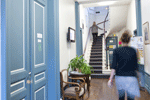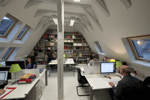
Le Studium Conferences - Counterpoints: Renaissance Music and Scholarly Debate in the Digital Domain
Date: 14 Novembre 2019 au 16 Novembre 2019
Lieu: Site CESR (Centre d'Etudes Supérieures de la Renaissance)
Résumé :
Prof. Richard Freedman
The allusiveness of musical discourse is so fundamental to the Western tradition that it is hard to imagine a work that does not in some way make reference to some other composition, type or topic. Indeed, music that refers to other music has been a constant in the European tradition of the last 1000 years. Citations: The Renaissance Imitation Mass (CRIM) (https://crimproject.org) focuses on one important but neglected part of this tradition: Imitation (or Parody) Mass of the sixteenth century, in which a composer transformed a short sacred or secular piece into a long five-movement cyclic setting of the Ordinary of the Catholic Mass. The resulting works are far more than collections of quotations. The sheer scope of the transformations required the composer to thoroughly re-think the model, shifting, extending, or compressing melodies to new musical contexts and expressive purposes. Indeed, if counterpoint is a craft of combinations, then the Imitation Mass involves the art of recombination on a massive scale.
CRIM builds upon recent developments in the digital domain for music scholarship, implementing a new kind of quotable text for music, using XML encodings of musical scores (based on the open-source Music Encoding Initiative standard), along with a robust digital platform for managing citations, claims, and counter-claims in a collaborative environment. Indeed, thanks to the efforts of an international team of musicologists and digital scholarship specialists, we have already compiled a dabatase of over thousands of relationships among Masses and their models. In this workshop-conference we will turn from the assembly of data to its interpretation, via presentations by small teams of scholars and researchers, as well as discussions focused around particular aspects of the project.
Key questions to be addressed include:
How did compositional practice change over the course of the sixteenth century, particularly as composers returned to adapt and redeploy earlier compositions in new guises and contexts? How can the Imitation Mass help us to tell that story in new and persuasive ways?
What connections can we draw between sixteenth-century statements on compositional practice and the various patterns that we can observe today? What new lines of transformation should we recognize in light of contemporary understandings of musical structure?
What relationship does the process of musical adaptation and modelling bear to the wider humanist concern for imitatio of classical models? Did sixteenth-century thinkers analogize music in this way? Can we use the Imitation Mass to learn how composers of the period competed with each other for prestige?
How do the processes of adaptation heard in our corpus compare with those of other musical periods?
How might the digital domain inaugurate new modes of collaborative research and scholarly communication?
Convenors
Prof. Richard Freedman, LE STUDIUM / Marie Skłodowska-Curie Research Fellowship
FROM Department of Music, Haverford College - US
IN RESIDENCE AT CESR (Centre d’Études Supérieures de la Renaissance) / Programme Ricercar / CNRS, University of Tours - FR
Prof. Philippe Vendrix,
CESR (Centre d’Études Supérieures de la Renaissance) / CNRS, University of Tours - FR










